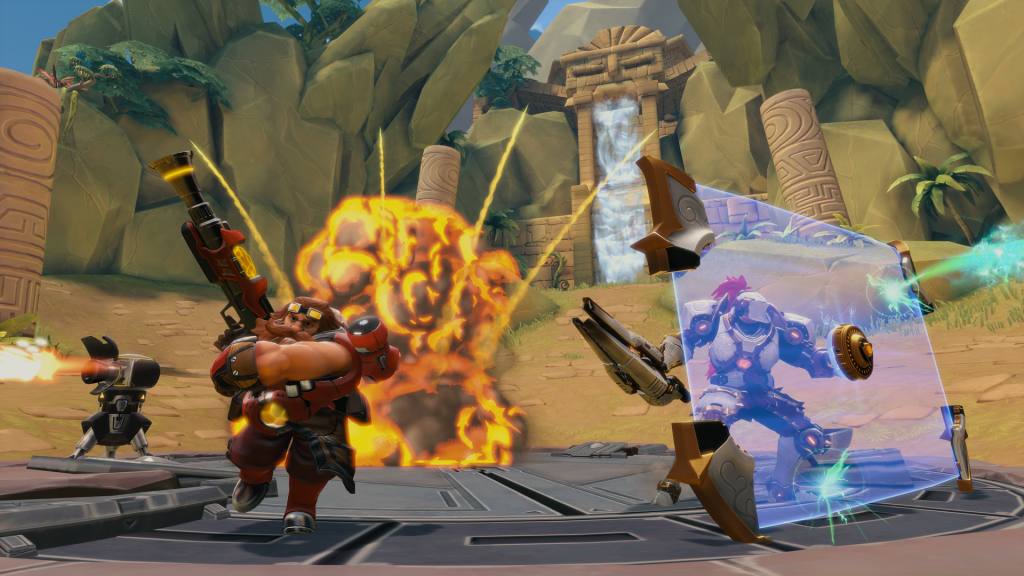Paladins players erupt in anger over 'pay-to-win' changes in latest patch
Beta 44 introduces a new currency called Essence, effectively locking high-end cards behind a paywall.

Players of Hi-Rez Studios' free-to-play hero shooter Paladins are venting their anger on Reddit and elsewhere over a recent change to the game that's widely seen as a blatant change to a "pay-to-win" system. The complaints are rooted in a new in-game currency called Essence, introduced in the open beta patch 44 that was rolled out last week.
It sounds innocuous enough in the patch notes: Radiant chests are now purchasable for 3000 Gold, an in-game currency earned playing the game, and so instead of awarding gold for any duplicate items they contain, players now get Essence, which is used to unlock high-end cards. Under the previous system, gold did the trick, so players willing to do a little grinding could advance at a reasonable rate without having to spend any money.
The trouble, as Ten Ton Hammer breaks down, is that the ratio is entirely out of whack. The cost to do anything meaningful with Essence is tremendously high, exacerbated by a new "rarity" ranking for loadout cards. The site states that even after unlocking every card for every Champion, 36,000 Essence per Champion is required to access all their Legendary cards, an astounding 756,000 Essence in total. The amount of Essence awarded for a duplicate Common card? 60.
The net result, according to multiple complaints in the Paladins subreddit, is that gold has been made effectively useless, and Paladins is now a pure pay-to-win proposition: You either fork over money for Crystals (the real-money currency), or you live without the bonuses and advantages that are granted to those who do. The new system is especially hard on new players, because veterans will keep the cards they've acquired under the old system, while newbies will have to start off with nothing.
Ironically, a post on Blizzard's Overwatch forums provided one of the most concise explanations of the core problem: Under this system, players are going to have to spend a ton if they want to get ahead.
"The previous system was a winner, you could choose whichever card you wanted, for 1200 gold, and it didn't take long to grind that much by playing, usually 3-4 matches, not counting win of the day bonuses etc. Now they have a system where you have to spend gold on chests for RNG cards, and the only way to buy a card is with a new currency, which is only given when you get duplicate cards in the chests," author Zalamael wrote.
"They allowed us to keep our cards, so long time players have every card available, with the exception of the new ones, but new players are screwed if they want a good deck. They can't even spend real money to level the playing field, because all they can do with real money is buy chests (so still suffer RNG) or buy boosters, which leads to the same problem. This isn't even a P2W system, because spending money wont get you ahead, unless you spend a fortune."
Keep up to date with the most important stories and the best deals, as picked by the PC Gamer team.
So it's not pay-to-win in the absolute strictest sense—you can't straight up buy the powerful Legendary cards you want—but players will likely have to put in a good deal of cash just for a chance to obtain them.
Youtuber Joshino spent a few minutes at the start of this stream showing of how quickly even veteran players with more than 100,000 Essence can burn through the resource crafting Legendary cards, and explains why the system will be especially punishing for new players.
Most of the complaints on Reddit are calling for a return to the previous system, although at least one argues that the new system could be made to work by dramatically increasing the rate of Essence rewards, reducing the cost of Legendary cards, and doing away with the rarity system entirely. So far, Hi-Rez hasn't indicated which way it will go, or if it will simply stay the course, and that hasn't made players any happier. I've emailed Hi-Rez to find out more about the situation, and will update if and when I receive a reply.

Andy has been gaming on PCs from the very beginning, starting as a youngster with text adventures and primitive action games on a cassette-based TRS80. From there he graduated to the glory days of Sierra Online adventures and Microprose sims, ran a local BBS, learned how to build PCs, and developed a longstanding love of RPGs, immersive sims, and shooters. He began writing videogame news in 2007 for The Escapist and somehow managed to avoid getting fired until 2014, when he joined the storied ranks of PC Gamer. He covers all aspects of the industry, from new game announcements and patch notes to legal disputes, Twitch beefs, esports, and Henry Cavill. Lots of Henry Cavill.


